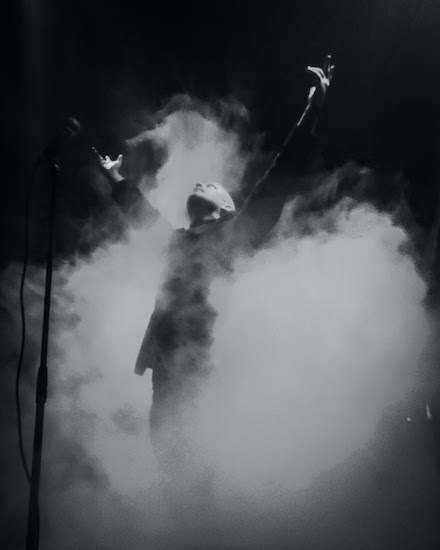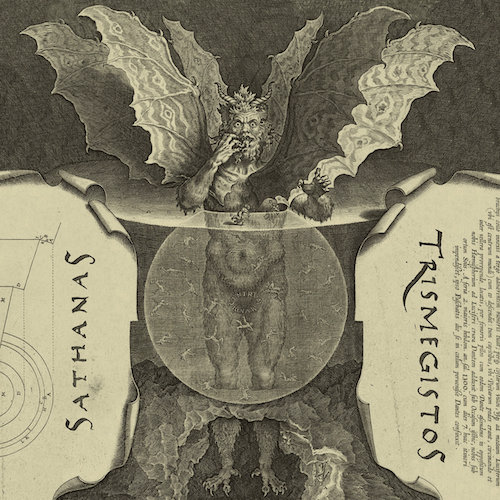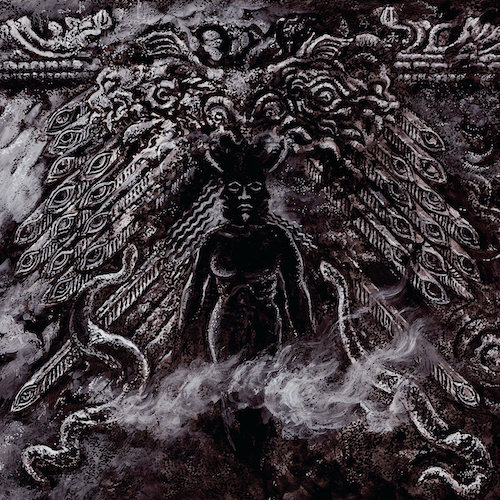
Photo by Linn Vilmann
(In this new interview Comrade Aleks spoke with Konstantin, a key figure within the Swedish band Head of the Demon, whose new album was just released at the end of April by Invictus Productions and The Ajna Offensive.)
Head Of The Demon from Sweden is one of those rare remarkable bands who have established their own individuality. Originally they mixed doom, a bit of black metal, and obscure rock influences with a Middle Eastern atmosphere of occult worship. But their debut Head Of The Demon (2012) and thr sophomore album Sathanas Trismegistos (2016) have their own distinctive features, and a new album with the title Deadly Black Doom leads even further through hallucinogenic fumes of thick toxic incense.
I’ve tried to find out about Head Of The Demon‘s roots with the help of Konstantin (guitars, bass), and this is where it leads us…
Hi Konstantin! What’s going on in Head Of The Demon’s lair? Did the quarantine influence the matters of Deadly Black Doom’s release?
Hello! Currently we have just released our third album and are quite busy with everything around that for now. But we have also started rehearsing and playing around with some new material too. This period of quarantine has luckily not affected the release in any way. There are some longer shipping times and we had to postpone a release gig that we were supposed to do on the 1st of May. But other than that no hassles with the release itself. But I must admit that we had very good timing with that title!
New material already? Were you so inspired that new songs appeared so fast or is it something that was left over from the session of Deadly Black Doom?
The album was written a year before recording it. Even if there still was plenty to fix prior to recording it, we have written some new stuff and only now have the time to properly play around with it and try out some ideas. And no, it ain’t leftovers from the latest sessions. Rather we begin anew with a fresh idea and hopefully a new approach to our creativity for each record.

Almost all of Head Of The Demon’s members played in different extreme metal bands having nothing in common with doom metal. What made you turn to this blackened kind of doom you have performed since 2012?
Well, most of the bands we have played in that are extreme metal have always had songs or long parts in songs that are quite doom-based. If you think of for example Mortuus, they are not your average blastbeat black metal band. Nor was Kaamos a stranger to doomy songs, of which we incorporated at least one on each release.
For me personally, bands like Black Sabbath, Candlemass, Cathedral, to mention some, have always been part of my digest, ever since a teen. When I quit Saturnalia Temple, of which I was part of forming, I was quite decided on quitting playing music altogether. But some kind of intelligence wanted something else. So not much to put against it, it was just to start creating again, and what came out was what was to become Head of the Demon’s debut album. And from that seed, and thence on, this genii has guided us.
What was Head Of The Demon’s concept when you were starting the band? What kind of features did you want to see in it?
Its aim is to manifest creative energy from the Demons’ head. Since its inception there was a creative spark that sought to materialize, and you just do your best to earth it. So the source and process which activates it is void of a rational idea or a specific concept. We try to translate what the genii shows. But generally we knew that the focus would be on creating and manifesting and trying to stay true to that spark.
Head Of The Demon – Dawn Walker
Your debut album has some features like a kind of Middle Eastern vibe which works very well with the themes of the songs you play. How did you come to the realization of this less popular influence in metal?
I guess it has always been with me, to some extent. I mean, the Arabic scale itself is of quite the mystical nature when you think about it. But even if this influence is less common it isn’t non-existent. Look at a band like Melechesh for example. But I am guessing that it is foremost its mysterious qualities that attract me to it. And its nature to convey it.
Metal-Archives points out that your early lyrical themes were focused on Lovecraft’s mythology and then you switched to Satanism and occultism. Is it true? What made you change direction?
Heh, what can I say, Metal Archives is Metal Archives and takes things very much on the surface. I am not saying that what they write is wrong, but one might as well put it that we have always been dealing and meddling with Satanism and the Occult. But on the debut album it was through the lense of the Lovecraft Mythos. But as soon as you mention Lovecraft, everything else you say fades into the background and what remains is the author’s name. So there hasn’t been a change in direction at all.
How did you entwine both themes in one album?
Well, if one has read enough Lovecraft and has an occult interest it will be quite evident that Lovecraft himself wedded the dark (satanic) experiences he had into the mythos that he created in order to understand and convey these experiences. So that job was already done.

Sathanas Trismegistos was released by Invictus Productions, while your debut was done in the DIY way. How important is it for you to be part of a label? And do you feel Head Of The Demon is a part of the metal or black metal community?
Our debut was recorded and released by the band indeed. But we only released it on vinyl in 2012. Ajna Offensive posthumously released the CD version in 2013 I believe. And since then we have worked jointly with Ajna and Invictus Productions for all our releases. It is important for us to be part of and co-operate with good labels. So with that said it has been very good and outright relieving to work with these two ones. I mean, we are first and foremost musically creative persons whose strength lies in writing music. Not in promoting, pressing and distributing the release, but rather writing it.
And yeah, I feel very much a part of the metal community since it is my firm opinion that Head of the Demon is rooted in it, and way darker and more metal than many metal, and also Black Metal, bands. But I like to think of us foremost as “Head of the Demon”, the black sheep of any genre, family, or whatnot.
Doesn’t it make it difficult to join some bands on tours or organize Head Of The Demon gigs? Hah… though who cares about the genre as long as it’s heavy and dark nowadays. I’ve just recalled Abysmal Grief’s gig in Saint-Petersburg alongside two black metal bands.
Not really.
Okay then, I’ve answered that myself. So Sathanas Trismegistos is placed between the rawer Head Of The Demon and the stronger and more focused Deadly Black Doom. How do you see the place of Sathanas Trismegistos in your discography? Did you feel back then that this album was at the top of your art at that moment?
Head of the Demon has worked for manifesting a vision that encapsulates each album. The debut was crude in a way that it should be and Sathanas Trismegistos is our ’60s album. Sounds strange right? But nonetheless true. Thus the very light distortion of the sound on it. The idea was to imagine how extreme metal might have sounded if it came in the ’60s. Taken together with psychedelics, the more dark hippie strains as found in the Manson family, and the like. I think we felt the album, when it had been recorded, was quite the achievement for us all. But I don’t feel like it is better than the first. More that they are really great albums in their own right.
Head Of The Demon – Sathanas Trismegistos
Deadly Black Doom keeps all features of the previous works, though it sounds obviously more mature by comparison to the Head Of The Demon debut. How do you see the band’s evolution on this album from the inside?
This is very difficult for me to trace. ‘Cause although I do hear evolution I can’t analyze it properly. The debut was written by itself, more or less as a channeling. The band Head of the Demon earthed it and opened a passageway for the intelligence to manifest. After that was complete we started writing the second album. Just as we did with the third. The evolution of this band is very much directed by the influence that guides it. We can either work towards it or work against it. We have become a band or constellation proper by now and with a stable line-up, and we can start understanding ideas faster than a couple of years back.
Do you have some algorithm in the band now with the stable line-up? Someone brings idea, someone writes main parts, someone works on arrangements, etc. By the way, do you discuss lyrics before you, Saibot, or Johannes write them down?
We have had the very same writing procedure always. I write the music and then me and the drummer rehearse and arrange it and when it starts getting complete the others come in and we start rehearsing more seriously. The others contribute as they feel and they’ve done both riffs, arrangements, and also lyrics. So it is quite dynamic even if there is like a main procedure. Since I have written all the lyrics except one so far it is not something we really discuss. But feedback and thoughts are thrown back and forth throughout the process of writing an album.

What were your main goals when you entered the studio in order to complete Deadly Black Doom? What kind of ideas or messages did you put in this material?
Since we recorded in a studio far from where we reside we feel we got into a longer and deeper feel for the music. Since we recorded it live I think it comes across well with our intention of doing it simple, in our meaning studio and production-wise, with the sound and aim of HotD. I believe that we evoked a good atmosphere and feeling on the album to convey it well. I guess the rest can be found as seeds on the record.
Back in the 19th century atheistic or even antichristian characters were portrayed as intellectual and cold-minded figures, but nowadays when the black metal movement sets the rules, its image seems to be very rarely connected with things logical. How is it for you to spread these kind of ideas through your music?
Nice observation there! I am very fond of this aristocratic Lucifer character that you speak of. I’d say it’s a medium for our creativity to express itself foremost as the constellation Head of the Demon. I don’t think we consider it as spreading ideas but rather we write about our ideas. But in one context, sure, there are formulae in the lyrics.
Isn’t the satanic concept in metal a limiting one in itself? I mean that when you’re stuck to monotheistic concepts you make yourself choose between two options. And the metal scene sometimes looks like, “okay, we are against the church’s hypocrisy, and the concept of a bearded man on a cloud is laughable, so then we choose the opposite side with brimstone and goat-headed androgyny as that seems to be a more adequate choice”. True to tell, I don’t understand why the idea of freedom is tied with Satan, as if you have no chance to stay outside this dualism.
You just hit the nail. I don’t think that the satanic concept is limited in itself in terms of being stagnant. Because as you mentioned, people usually view it from a dualistic perspective. There are so many other perspectives as well. Especially if you mean Satan as the great shadow.
Can you name some books which could help to better understand Head Of The Demon’s essence and Deadly Black Doom especially?
No books in particular. But if one has some kind of interest in the occult the lyrics will have deeper meaning of course.
Thanks for the interview Konstantin! Would you like to add something else for our readers?
Thanks for the interview! Deadly Black Doom is upon us!
https://invictusproductions666.bandcamp.com/album/deadly-black-doom
https://headofthedemon.bandcamp.com/
https://www.facebook.com/HEAD-OF-THE-DEMON-272786519504397/
